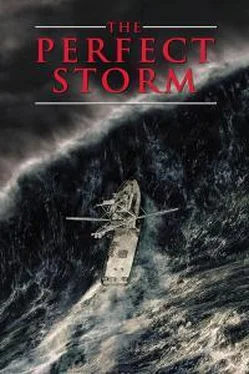Sebastian Junger - The Perfect Storm
Здесь есть возможность читать онлайн «Sebastian Junger - The Perfect Storm» — ознакомительный отрывок электронной книги совершенно бесплатно, а после прочтения отрывка купить полную версию. В некоторых случаях можно слушать аудио, скачать через торрент в формате fb2 и присутствует краткое содержание. Жанр: Триллер, Проза. Описание произведения, (предисловие) а так же отзывы посетителей доступны на портале библиотеки ЛибКат.
- Название:The Perfect Storm
- Автор:
- Жанр:
- Год:неизвестен
- ISBN:нет данных
- Рейтинг книги:3 / 5. Голосов: 1
-
Избранное:Добавить в избранное
- Отзывы:
-
Ваша оценка:
- 60
- 1
- 2
- 3
- 4
- 5
The Perfect Storm: краткое содержание, описание и аннотация
Предлагаем к чтению аннотацию, описание, краткое содержание или предисловие (зависит от того, что написал сам автор книги «The Perfect Storm»). Если вы не нашли необходимую информацию о книге — напишите в комментариях, мы постараемся отыскать её.
The Perfect Storm — читать онлайн ознакомительный отрывок
Ниже представлен текст книги, разбитый по страницам. Система сохранения места последней прочитанной страницы, позволяет с удобством читать онлайн бесплатно книгу «The Perfect Storm», без необходимости каждый раз заново искать на чём Вы остановились. Поставьте закладку, и сможете в любой момент перейти на страницу, на которой закончили чтение.
Интервал:
Закладка:
A FEW modern swordfishing boats still fish Georges Bank, but most make the long trip to the Grand. They're out for longer but come back with more fish—the old trade-off. It takes a week to reach the Grand Banks on a modern sword boat. You drive east-northeast around the clock until you're 1,200 miles out of Gloucester and 400 miles out of Newfoundland. From there it's easier to get to the Azores than back to the Crow's Nest. Like Georges, the Grand Banks are shallow enough to allow sunlight to penetrate all the way to the bottom. An infusion of cold water called the Labrador Current crosses the shoals and creates the perfect environment for plankton; small fish collect to feed on the plankton, and big fish collect to feed on the small fish. Soon the whole food chain's there, right up to the seventy-foot sword boats.
The trips in and out are basically the parts of the month that swordfishermen sleep. In port they're too busy cramming as much life as they can into five or six days, and on the fishing grounds they're too busy working. They work twenty hours a day for two or three weeks straight and then fall into their bunks for the long steam back. The trips entail more than just eating and sleeping, though. Fishing gear, like deck gear, takes a terrific amount of abuse and must be repaired constantly. The crew doesn't want to waste a day's fishing because their gear's messed up, so they tend to it on the way out: they sharpen hooks, tie gangions, tie ball drops, set up the leader cart, check the radio buoys. At the Hague Line—where they enter Canadian waters—they must stow the gear in accordance with international law, and are briefly without anything to do. They sleep, talk, watch TV, and read; there are high school dropouts who go through half a dozen books on the Grand Banks.
Around eight or nine at night the crew squeeze into the galley and shovel down whatever the cook has put together. (Murph is the cook on the Andrea Gail; he's paid extra and stands watch while the other men eat.) At dinner the crew talk about what men everywhere talk about—women, lack of women, kids, sports, horseracing, money, lack of money, work. They talk a lot about work; they talk about it the way men in prison talk about time. Work is what's keeping them from going home, and they all want to go home. The more fish they catch, the sooner the trip's over, which is a simple equation that turns them all into amateur marine biologists. After dinner someone takes his turn at the dishes, and Billy goes back up to the wheelhouse so Murph can eat. No one likes washing dishes, so guys sometimes trade the duty for a pack of cigarettes. The longer the trip, the cheaper labor gets, until a $50,000-a-year fisherman is washing dishes for a single smoke. Dinner, at the end of such a trip, might be a bowl of croutons with salad dressing.
Everyone on the crew stands watch twice a day. The shifts are two hours long and involve little more than watching the radar and occasionally punching numbers into the autopilot. If the gear is out, the night watches might have to jog back onto the mainline to keep from drifting too far away. The Andrea Gail has a padded chair in her wheelhouse, but it's set back from the helm so that no one can fall asleep on watch. The radar and loran are bolted to the ceiling, along with the VHF and single sideband, and the video plotter and autopilot are on the control panel to the left. There are nine Lexan® windows and a pistol-grip spotlight that protrudes from the ceiling. The wheel is the size of a bicycle tire and positioned at the very center of the helm, about waist high. There's no reason to touch the wheel unless the boat has been taken off autopilot, and there's almost no reason to take the boat off autopilot. From time to time the helmsman checks the engine room, but otherwise he just stares out at sea. Strangely, the sea doesn't get tedious to look at—wave trains converge and crisscross in patterns that have never happened before and will never happen again. It can take hours to tear one's eyes away.
Billy Tyne's been out to the Grand Banks dozens of times before, and he's also fished off the Carolinas, Florida, and deep into the Caribbean. He grew up on Gloucester Avenue, near where Route 128 crosses the Annisquam River, and married a teenaged girl who lived a few blocks away. Billy was exceptional for downtown Gloucester in that he didn't fish and his family was relatively well-off. He ran a Mexican import business for a while, worked for a vault manufacturer, sold waterbeds. His older brother was killed at age twenty-one by a landmine in Vietnam, and perhaps Billy drew the conclusion that life was not something to be pissed away in a bar. He enrolled in school, set his sights on being a psychologist, and started counselling drug-addicted teenagers. He was searching for something, trying out different lives, but nothing seemed to fit. He dropped out of school and started working again, but by then he had a wife and two daughters to support. His wife, Jodi, had been urging him to give fishing a try because she had a cousin whose husband made a lot of money at it. You never know, she told him, you just might like it.
"It was all over after that,” says Jodi. "The men don't know anything else once they do it; they love it and it takes over and that's the bottom line. People get possessed with church or God and fishing's just another thing they're possessed with. It's something inside of them that nobody can take away and if they're not doin' it they're not gonna be happy."
It helped, of course, that Billy was good at it. He had an uncanny ability to find fish, a deep sense of where they were. "It was weird—it was like he had radar," says Jodi. "He was one of the few guys who could go out and catch fish all the time. Everyone always wanted to fish with him 'cause he always made money." Tyne's very first trip was on the Andrea Gail, and after that he switched over to the Linnea C., owned by a man named Warren Cannon. Tyne and Cannon became close friends and, for eight years, Cannon taught him everything he knew. After his long apprenticeship Tyne decided to go out on his own, and he began to take out the Haddit— "that fuckin' Clorox bottle," as Charlie Reed called it. (It was a fiberglass boat.) By this time Tyne was fully hooked; the strains of being at sea had split up his marriage, but he still wouldn't give it up. He moved to Florida to be closer to his ex-wife and daughters, and fished harder than ever.
Every summer Tyne's two daughters, Erica and Billie Jo, went up to Gloucester to visit their grandparents, and Tyne would stop over between trips to see them. He also kept in touch with Charlie Reed, and when Reed stepped down from the Andrea Gail, Billy's name came up. Brown offered him a site as skipper of the boat and one-third of the crew share. It was a good deal; a man like Tyne could clear $100,000 a year that way. He accepted. In the meantime, Reed got a job on a ninety-foot steel dragger called the Corey Pride. He'd make less money, but he'd spend more time at home. "I just couldn't get into the gypsy life anymore," Reed says. "Movin' around, not cornin' home three months at a time—I got by, but it was hell on my wife. And I thought I'd made enough to keep all my kids in school. I hadn't, but I thought I had."
THE Andrea Gail rides out to the fishing grounds on the back of a high pressure system that comes bulging out of Canada. The winds are out of the northwest and the skies are a deep sharp blue. These are the prevailing winds for the area; they are the reason people say "Down East" when they refer to northeast Maine. Schooners that hauled eastward downwind could be in St. John's or Halifax within twenty-four hours. A 365-horsepower diesel engine makes the effect less pronounced, but heading out is still a shorter trip than heading in. By September 26th or 27th, Billy Tyne's around 42 north and 49 west, about 300 miles off the tip of Newfoundland, in a part of the Grand Banks known as the "Tail." Canadian National Waters, which extend two hundred miles offshore, exclude foreign boats from most of the Banks, but two small sections protrude to the northeast and southeast: the Nose and the Tail. Sword boats patrol an arc hinging on a spot around 50 degrees west and 44 degrees north. Inside that arc are the broad, fertile submarine plains of the Grand Banks, off-limits to all but Canadian boats and licensed foreign boats. Outside that arc are thousands of legal swordfish that might conceivably be fooled by a mackerel hung on a big steel hook.
Читать дальшеИнтервал:
Закладка:
Похожие книги на «The Perfect Storm»
Представляем Вашему вниманию похожие книги на «The Perfect Storm» списком для выбора. Мы отобрали схожую по названию и смыслу литературу в надежде предоставить читателям больше вариантов отыскать новые, интересные, ещё непрочитанные произведения.
Обсуждение, отзывы о книге «The Perfect Storm» и просто собственные мнения читателей. Оставьте ваши комментарии, напишите, что Вы думаете о произведении, его смысле или главных героях. Укажите что конкретно понравилось, а что нет, и почему Вы так считаете.












